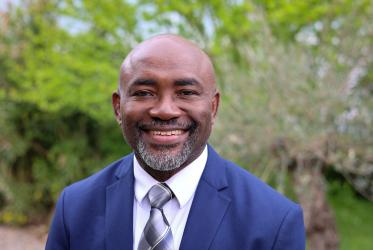Inclusion and participation of persons with disability promoted in Evangelical seminaries in Peru
As a result of the sensitization and training activities carried out recently in the cities of Lima and Chiclayo, representatives and/or members of Evangelical Christian theological institutions in Peru, churches and evangelical associations, pastors, students of theological seminaries, representatives of state institutions and civil society met to share ideas and experiences, and coordinate efforts, with a view to incorporating the theme of disability into their curricular plans and promoting the socio-ecclesial participation of persons with disability in their institutions.
This decision is the result of International Forums and training seminars/ workshops carried out by the Coalition EDAN-MUR, that is, the Ecumenical Disability Advocates Network (EDAN) in Latin America and Urban and Rural Mission (MUR) of Peru, in the cities of Lima and Chiclayo from September 6 to 9, with the support of EDAN, a Programme of the World Council of Churches, at the global level.
In Peru, according to figures from the National Statistical Institute’s first National Specialized Survey on Disability, 2012, there are 1,575,402 persons with some kind of disability, that is, 5.2% of the total population, 754,671 being men and 820,731 women. This same source points out that less than 20% of persons with disability in the country have any form of remunerated employment, 80% do not have access to education and more than 90% do not have a disability certificate.
Rev. Noel Fernández, of Cuban nationality and Coordinator of EDAN Latin America, declared that in the face of this reality the church and society should not remain indifferent, and so the Ecumenical Disability Advocates Network has joined forces once again with the Urban and Rural Mission, an ecumenical movement associated with the World Council of Churches, and together, as the Coalition EDAN-MUR, promoted this proposal, which has shown encouraging results over the short term.
It is worth highlighting that this initiative called together important allies, gaining the support of the Ministry of Education’s General Management of Special Basic Education, the National Council for the Inclusion of Persons with Disability, through expert professionals in the field of inclusive education and the issue of disability in the country. The Charitable Society of Lima, the Office of the Member of Congress John Reynaga and the Pilgrims Church Biblical Seminary of Chiclayo also endorsed this initiative from the outset. In this regard, Oscar Bravo, Coordinator of the Coalition EDAN-MUR, pointed out that the commitment and contribution of different social agents do not only create social capital, but also represent a significant achievement as they will contribute to the sustainability of the proposal.
Another important achievement of this campaign for inclusion was the receptivity obtained in diverse theological institutions in Lima, Chiclayo and Trujillo. In Lima, five theological institutions have become committed in one form or another, to the task of including the theme of disability in their curriculums, while in Chiclayo there were three, and one in Trujillo. All will give continuity to the theme in which the Coalition EDAN-MUR commits itself in assessment and collaboration. The intention of the organizers of the two Forums and the two seminars/workshops previously mentioned is to continue incorporating other centres of theological studies. There is no doubt that an adequate theological formation requires that the theme of disability constitute a curricular tool in said institutions.
Rolando Verdecia, also of Cuban nationality and EDAN-Latin America’s Regional Coordinator for the Caribbean and Great Colombia, pointed out that the Coalition EDAN-MUR edited and distributed among participants the publication “Teología y Discapacidad: Hacia la inclusión socio-eclesial de las personas con discapacidad” [Theology and Disability; Towards socio-ecclesial inclusion of persons with disability], which may be solicited in print in Lima, via email to [email protected] and will soon be available online at www.edanmurcoalicion.org. The aim of this publication was to present theological considerations with respect to disability, a proper way of relating to persons with disability, tools for communication, conflict resolution and fundraising, that will contribute to the sustainability of the experience gained in the seminars/workshops and assist in the institutional processes of including the theme of disability in their curriculums.


